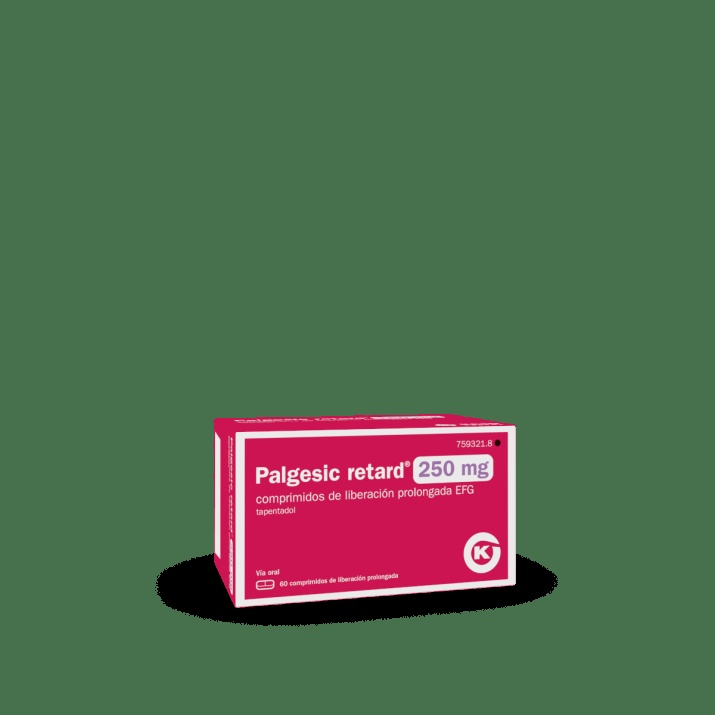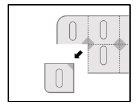
PALGESIC RETARD 250 mg PROLONGED-RELEASE TABLETS


How to use PALGESIC RETARD 250 mg PROLONGED-RELEASE TABLETS
Translated with AI
This page provides general information and does not replace a doctor’s consultation. Always consult a doctor before taking any medication. Seek urgent medical care if symptoms are severe.
Show originalContents of the leaflet
Introduction
Package Leaflet: Information for the User
Palgesic retard 25 mg prolonged-release tablets EFG
Palgesic retard 50 mg prolonged-release tablets EFG
Palgesic retard 100 mg prolonged-release tablets EFG
Palgesic retard 150 mg prolonged-release tablets EFG
Palgesic retard 200 mg prolonged-release tablets EFG
Palgesic retard 250 mg prolonged-release tablets EFG
tapentadol
Read the entire package leaflet carefully before starting to take this medication, as it contains important information for you.
- Keep this package leaflet, as you may need to read it again.
- If you have any questions, consult your doctor or pharmacist.
- This medication has been prescribed to you only, and you should not give it to others, even if they have the same symptoms as you, as it may harm them.
- If you experience side effects, consult your doctor or pharmacist, even if they are not listed in this package leaflet. See section 4.
Contents of the Package Leaflet
- What is Palgesic retard and what is it used for
- What you need to know before taking Palgesic retard
- How to take Palgesic retard
- Possible side effects
- Storage of Palgesic retard
- Package contents and additional information
1. What is Palgesic retard and what is it used for
Tapentadol - the active substance of Palgesic retard - is a potent analgesic that belongs to the class of opioids.
Tapentadol is used for the treatment of severe chronic pain in adults that can only be adequately treated with an opioid analgesic.
2. What you need to know before taking Palgesic retard
Do not take Palgesic retard
- if you are allergic to tapentadol or any of the other ingredients of this medication (listed in section 6),
- if you have asthma or if your breathing is slow or shallow to dangerous levels [respiratory depression; hypercapnia (elevated carbon dioxide levels in the blood)],
- if you have a disease in which the intestine does not function properly (paralytic ileus),
- if you have consumed alcohol, sleeping pills, other analgesics, or other psychotropic medications (medications that affect mood and emotions) at high doses (see section "Other medications and tapentadol").
Warnings and precautions
Consult your doctor or pharmacist before starting to take tapentadol:
- if your breathing is slow or shallow,
- if you have increased intracranial pressure or altered consciousness up to coma,
- if you have had a head injury or brain tumors,
- if you have liver or kidney disease (see section "How to take Palgesic retard"),
- if you have a disease of the pancreas (such as pancreatitis) or bile ducts,
- if you are taking medications called mixed opioid agonist/antagonists (e.g., pentazocine, nalbuphine) or partial agonists of opioid μ receptors (e.g., buprenorphine),
- if you are prone to epilepsy or convulsive seizures, or if you are taking other medications with a known risk of increasing seizures, as the risk of these seizures may increase,
- if you or a family member have a history of substance abuse or dependence on prescription medications or illicit substances ("addiction"),
- if you smoke,
- if you have ever had problems with your mood (depression, anxiety, or personality disorder) or have received psychiatric treatment for other mental illnesses.
This medication contains tapentadol, which is an opioid medication. Repeated use of opioid analgesics can lead to decreased efficacy of the medication (you may become accustomed to it). It can also lead to dependence and abuse, which can result in a potentially fatal overdose. It is essential that you inform your doctor if you think you may have developed dependence on tapentadol. Its use (even at therapeutic doses) can cause physical dependence, which may lead to withdrawal symptoms and a recurrence of your problems if you stop taking this medication abruptly.
Tapentadol can cause physical and psychological addiction. If you have a tendency to abuse medications or have medication dependence, you should take these tablets only for short periods under strict medical supervision.
Sleep-related respiratory disorders
Tapentadol can cause sleep-related respiratory disorders such as sleep apnea (pauses in breathing during sleep) and sleep-related hypoxemia (low oxygen levels in the blood). Symptoms may include pauses in breathing during sleep, nighttime awakenings due to difficulty breathing, difficulty maintaining sleep, or excessive daytime sleepiness. If you or someone else observes these symptoms, consult your doctor. Your doctor may consider reducing the dose.
Other medications and tapentadol
Tell your doctor or pharmacist if you are taking, have recently taken, or may need to take any other medication.
The risk of side effects increases if you are taking medications that can cause seizures (attacks), such as certain antidepressants or antipsychotics. The risk of seizures increases if you take tapentadol simultaneously with these medications. Your doctor will tell you if tapentadol is suitable for you.
The concomitant use of tapentadol and sedative medications such as benzodiazepines or related medications (certain sleeping pills or tranquilizers [e.g., barbiturates] or analgesics like opioids, morphine, and codeine [also as a cough medication], antipsychotics, antihistamines H1, alcohol) increases the risk of drowsiness, respiratory difficulties (respiratory depression), coma, and can be potentially fatal. Due to this, concomitant use should only be considered when no other treatment options are possible.
However, if your doctor prescribes tapentadol with sedative medications, they will limit the dose and duration of concomitant treatment.
The concomitant use of opioids and medications used to treat epilepsy, nerve pain, or anxiety (gabapentin and pregabalin) increases the risk of opioid overdose, respiratory depression, and can be potentially fatal.
Tell your doctor if you are taking gabapentin or pregabalin or any other sedative medication, and follow your doctor's dosage recommendations strictly. It may be helpful to inform friends or family members so they are aware of the signs and symptoms mentioned above. Contact your doctor when you experience these symptoms.
If you are taking a type of medication that affects serotonin levels (e.g., certain medications for treating depression), talk to your doctor before taking tapentadol, as there have been cases of "serotonin syndrome". Serotonin syndrome is a rare but potentially life-threatening disorder. Symptoms can include involuntary muscle contractions, agitation, excessive sweating, tremors, exaggerated reflexes, increased muscle tension, and body temperature above 38°C. Your doctor can provide additional information.
The concomitant administration of tapentadol with other types of medications called mixed opioid agonist/antagonists (e.g., pentazocine, nalbuphine) or partial agonists of opioid μ receptors (e.g., buprenorphine) has not been studied. It is possible that tapentadol may not have the same efficacy if administered with one of these medications. Tell your doctor if you are currently being treated with one of these medications.
The administration of tapentadol with potent inhibitors or inducers (e.g., rifampicin, phenobarbital, St. John's Wort) of certain enzymes necessary for the elimination of tapentadol from your body may affect the efficacy of tapentadol or cause side effects, especially when starting or stopping this other type of medication. Keep your doctor informed about all medications you are taking.
Tapentadol should not be taken with MAO inhibitors (medications for treating depression). Tell your doctor if you are taking MAO inhibitors or if you have taken them in the last 14 days.
Taking tapentadol with food, drinks, and alcohol
Do not consume alcohol while taking tapentadol, as some of its side effects, such as drowsiness, may increase. Food intake does not affect the effect of this medication.
Pregnancy and breastfeeding
If you are pregnant or breastfeeding, think you may be pregnant, or plan to become pregnant, consult your doctor or pharmacist before using this medication.
Do not take this medication:
- if you are pregnant, unless your doctor has indicated it, as prolonged use of tapentadol during pregnancy may cause withdrawal symptoms in the newborn, which can be life-threatening if not detected and treated by a doctor,
- during labor, as it may cause slow or shallow breathing to dangerous levels (respiratory depression) in the newborn,
- during breastfeeding, as it may be excreted in breast milk.
Driving and using machines
Ask your doctor if you can drive or use machines during treatment with tapentadol. It is essential that you observe how this medication affects you before driving or using machines. Do not drive or use machines if you feel drowsy, dizzy, have blurred vision, or have difficulty concentrating. Be especially careful when starting treatment, after a dose change, or when taking it concomitantly with alcohol or tranquilizers.
3. How to take Palgesic retard
Follow the instructions for administration of this medication indicated by your doctor or pharmacist. If in doubt, consult your doctor or pharmacist again.
Your doctor will adjust the dose based on the intensity of your pain and your personal sensitivity to pain. Generally, you should take the minimum effective dose to relieve pain.
The tablet can be divided into equal doses.
Adults
The recommended dose is 1 tablet every 12 hours. Daily doses above 500 mg of tapentadol are not recommended.
Your doctor may prescribe a different dose or dosing regimen, which is more suitable for you if necessary. If you think the effect of these tablets is too strong or too weak, consult your doctor or pharmacist.
Elderly patients
In elderly patients (over 65 years of age), the dose does not usually need to be adjusted. However, the elimination of tapentadol may be delayed and slower in some patients in this age group. If this applies to you, your doctor may prescribe a different dosing regimen.
Liver and kidney diseases (liver and kidney failure)
Patient with severe liver problems should not take these tablets. If you have moderate liver problems, your doctor will prescribe a different dosing regimen. In cases of mild liver problems, no dose adjustment is necessary.
Patient with severe kidney problems should not take these tablets. In cases of mild or moderate kidney problems, no dose adjustment is necessary.
Use in children and adolescents
Tapentadol is not indicated in children and adolescents under 18 years of age.
How and when to take tapentadol
Tapentadol should be taken orally.
Always take the tablets with a sufficient amount of liquid.
You can take the tablets whole or broken in half along the score line. Do not chew or crush them, as this could lead to an overdose because the active substance will be released into your body too quickly.
You can take them on an empty stomach or with food.
The tablet coating may not be completely digested and may appear, apparently unchanged, in the stool. This should not concern you, as the active substance of the tablet will have already been absorbed by the body, and what you see is only the empty coating.
Instructions for opening the blister pack
This medication is packaged in child-resistant, single-dose blister packs. You cannot push the tablet through the blister pack. Please follow the instructions for opening the blister pack:
- Cut a dose along the pre-cut lines of the blister pack.

- Locate the non-sealed area where the pre-cut lines intersect.

- Pull the non-sealed area to detach the foil

How long to take tapentadol
Do not take the tablets for longer than your doctor has indicated.
If you take more tapentadol than you should
After taking very high doses, you may experience some of the following effects:
- pupils very reduced, vomiting, decreased blood pressure, rapid heartbeat, fainting, altered consciousness or coma (deep loss of consciousness), epileptic seizures, slow or shallow breathing to dangerous levels or respiratory arrest.
If any of these things happen to you, call a doctor immediately!
In case of overdose or accidental ingestion, consult your doctor or pharmacist immediately or call the Toxicology Information Service, phone: 91 562 04 20, indicating the medication and the amount used. It is recommended to take the packaging and package leaflet of the medication to the healthcare professional.
If you forget to take tapentadol
If you forget to take a tablet, you will probably feel pain again. Do not take a double dose to make up for the forgotten doses, but continue taking the tablets as before.
If you stop taking tapentadol
If you stop or discontinue treatment too soon, you will probably feel pain again. If you want to stop treatment, consult your doctor before doing so.
Generally, patients do not experience any side effects after stopping treatment, but in rare cases, people who have taken the tablets for a long time may feel unwell if they stop taking them suddenly.
The symptoms may be:
- restlessness, tearful eyes, runny nose, yawning, sweating, chills, muscle pain, and dilated pupils,
- irritability, anxiety, back pain, joint pain, weakness, abdominal cramps, difficulty sleeping, nausea, loss of appetite, vomiting, diarrhea, and increased blood pressure, respiratory rate, or heart rate.
If you experience any of these symptoms after stopping treatment, consult your doctor.
You should not stop taking this medication abruptly, unless your doctor tells you to do so. If your doctor wants you to stop taking these tablets, they will tell you how to do it, which may involve gradually reducing the dose.
If you have any further questions about the use of this medication, ask your doctor or pharmacist.
4. Possible Adverse Effects
Like all medications, this medication can produce adverse effects, although not all people suffer from them.
Adverse effects or important symptoms to be aware of and what to do if you are affected by them:
This medication may cause allergic reactions. The symptoms may consist of wheezing (a type of whistling when breathing), difficulty breathing, swelling of the eyelids, face, or lips, skin rash, or itching, especially if they affect the whole body.
Another serious adverse effect consists of breathing more slowly or more weakly than normal. It occurs mostly in elderly patients or weakened patients.
If you present any of these important symptoms, consult your doctor immediately.
Other adverse effects that may occur:
Very frequent(may affect more than 1 in 10 people): nausea, constipation, dizziness, drowsiness, headache.
Frequent(may affect up to 1 in 10 people): decreased appetite, anxiety, depression of mood, difficulty sleeping, nervousness, restlessness, attention disorders, tremors, muscle tics, hot flashes, shortness of breath, vomiting, diarrhea, indigestion, itching, increased sweating, skin rashes, feeling of weakness, fatigue, feeling of change in body temperature, dryness of the mucous membranes, water accumulation in the tissues (edema).
Infrequent(may affect up to 1 in 100 people): allergic reaction to medications (including swelling under the skin, urticarial hives, and in severe cases, difficulty breathing, decreased blood pressure, collapse, or shock), weight loss, disorientation, confusion, excitability (agitation), perception disorders, sleep disorders, mood elevation, depression of the  level of consciousness, memory impairment, mental deterioration, fainting, sedation, balance disorders, speech difficulties, numbness, abnormal sensations in the skin (such as tingling, itching), vision disorders, accelerated heartbeats, slow heartbeats, palpitations, decreased blood pressure, abdominal discomfort, rash, delayed urination, frequent urination, sexual dysfunction, drug withdrawal syndrome (see section "If you stop treatment with tapentadol"), feeling of discomfort, irritability.
level of consciousness, memory impairment, mental deterioration, fainting, sedation, balance disorders, speech difficulties, numbness, abnormal sensations in the skin (such as tingling, itching), vision disorders, accelerated heartbeats, slow heartbeats, palpitations, decreased blood pressure, abdominal discomfort, rash, delayed urination, frequent urination, sexual dysfunction, drug withdrawal syndrome (see section "If you stop treatment with tapentadol"), feeling of discomfort, irritability.
Rare(may affect up to 1 in 1,000 people): drug dependence, thought disorder, epileptic seizures, feeling of being about to faint, altered coordination, slow or shallow breathing to dangerous levels (respiratory depression), altered gastric emptying, feeling of intoxication, feeling of relaxation.
Frequency not known(cannot be estimated from the available data): delirium.
In general, the possibility of having suicidal thoughts and behaviors increases in patients with chronic pain. Additionally, some medications for treating depression (with an impact on the brain's neurotransmitter system) may increase this risk, especially at the beginning of treatment. Although tapentadol also affects neurotransmitters, experience in patients has not proven that it increases this risk.
Reporting of Adverse Effects
If you experience any type of adverse effect, consult your doctor or pharmacist, even if it is a possible adverse effect that does not appear in this prospectus. You can also report them directly through the Spanish Pharmacovigilance System for Human Use Medications: https://www.notificaram.es. By reporting adverse effects, you can contribute to providing more information on the safety of this medication.
5. Conservation of Palgesic Retard
Keep this medication out of sight and reach of children.
Do not use this medication after the expiration date that appears on the box and on the blister after CAD. The expiration date is the last day of the month indicated.
This medication does not require special storage conditions.
Medications should not be thrown away through the sewers or in the trash. Deposit the containers and medications you no longer need in the SIGRE Point of the pharmacy. Ask your pharmacist how to dispose of the containers and medications you no longer need. This way, you will help protect the environment.
6. Content of the Package and Additional Information
Composition of Palgesic Retard
The activeprinciple is tapentadol.
Palgesic Retard 25 mg prolonged-release tablets EFG
Each prolonged-release tablet contains 25 mg of tapentadol (in the form of phosphate).
Palgesic Retard 50 mg prolonged-release tablets EFG
Each prolonged-release tablet contains 50 mg of tapentadol (in the form of phosphate).
Palgesic Retard 100 mg prolonged-release tablets EFG
Each prolonged-release tablet contains 100 mg of tapentadol (in the form of phosphate).
Palgesic Retard 150 mg prolonged-release tablets EFG
Each prolonged-release tablet contains 150 mg of tapentadol (in the form of phosphate).
Palgesic Retard 200 mg prolonged-release tablets EFG
Each prolonged-release tablet contains 200 mg of tapentadol (in the form of phosphate).
Palgesic Retard 250 mg prolonged-release tablets EFG
Each prolonged-release tablet contains 250 mg of tapentadol (in the form of phosphate).
The othercomponents (excipients) are:
- Core of the tablet: microcrystalline cellulose, hypromellose, colloidal anhydrous silica, magnesium stearate.
- Coating of the tablet: hypromellose, glycerol, talc, microcrystalline cellulose, titanium dioxide (E 171),
iron oxide red (E172) (only for the 25, 100, 150, 200, and 250 mg doses), iron oxide yellow (E172) (only for the 25, 100, and 200 mg doses), iron oxide black (E172) (only for the 25, 100, 150, 200, and 250 mg doses).
Appearance of Palgesic Retard and Content of the Package
Palgesic Retard 25 mg prolonged-release tablets EFG:film-coated brown, oblong, biconvex tablets (5.7 mm x 12.2 mm), with a score on both sides.
Palgesic Retard 50 mg prolonged-release tablets EFG:film-coated white, oblong, biconvex tablets (6.2 mm x 13.2 mm), with a score on both sides.
Palgesic Retard 100 mg prolonged-release tablets EFG:film-coated yellowish, oblong, biconvex tablets (6.7 mm x 14.2 mm), with a score on both sides.
Palgesic Retard 150 mg prolonged-release tablets EFG:film-coated reddish-brown, oblong, biconvex tablets (7.2 mm x 15.2 mm), with a score on both sides.
Palgesic Retard 200 mg prolonged-release tablets EFG:film-coated yellow, oblong, biconvex tablets (7.7 mm x 16.2 mm), with a score on both sides.
Palgesic Retard 250 mg prolonged-release tablets EFG:film-coated brown-red, oblong, biconvex tablets (8.7 mm x 18.2 mm), with a score on both sides.
Available in packages of 60 units, packaged in child-resistant, pre-cut, single-dose aluminum-PVC/PE/PVDC blisters.
Marketing Authorization Holder
Kern Pharma, S.L.
Venus, 72 - Pol. Ind. Colón II
08228 Terrassa – Barcelona
Spain
Manufacturer
Develco Pharma GmbH
Grienmatt 27
79650 Schopfheim
Germany
Date of the Last Revision of this Prospectus: August 2023
Detailed information about this medication is available on the website of the Spanish Agency for Medicines and Health Products (AEMPS) (http://www.aemps.gob.es/)
- Country of registration
- Average pharmacy price110.06 EUR
- Active substance
- Prescription requiredYes
- Manufacturer
- This information is for reference only and does not constitute medical advice. Always consult a doctor before taking any medication. Oladoctor is not responsible for medical decisions based on this content.
- Alternatives to PALGESIC RETARD 250 mg PROLONGED-RELEASE TABLETSDosage form: MODIFIED-RELEASE TABLET, 100 mgActive substance: tapentadolManufacturer: Sandoz Farmaceutica S.A.Prescription requiredDosage form: MODIFIED-RELEASE TABLET, 150 mgActive substance: tapentadolManufacturer: Sandoz Farmaceutica S.A.Prescription requiredDosage form: MODIFIED-RELEASE TABLET, 200 mgActive substance: tapentadolManufacturer: Sandoz Farmaceutica S.A.Prescription required
Online doctors for PALGESIC RETARD 250 mg PROLONGED-RELEASE TABLETS
Discuss questions about PALGESIC RETARD 250 mg PROLONGED-RELEASE TABLETS, including use, safety considerations and prescription review, subject to medical assessment and local regulations.
Frequently Asked Questions















